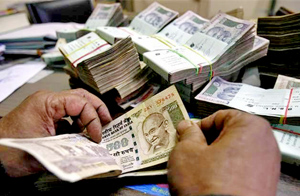New Delhi, Feb 15: In order to speed up its probe into cases of illegal funds stashed abroad, the SIT on black money has roped in one more economic intelligence agency -- CEIB -- as the main "coordinating body" between all the investigative and enforcement agencies which are part of the high-powered panel.
The Special Investigation Team (SIT) had wanted to name the Enforcement Directorate (ED) as the chief coordinating agency for the panel -- which has close to a dozen central agencies working on it -- but chose the Central Economic Intelligence Bureau (CEIB) for the important role.
The SIT zeroed in on CEIB after it was found that the agency had all the resources at its disposal for handling the role while ED is already overburdened with money laundering and foreign exchange violation cases and is facing a manpower shortage as well.
"CEIB has recently been appointed as the main coordinating body for the SIT. It is the 12th agency which will work with the SIT on black money, albeit from the sidelines and not as a part of the core panel," said sources privy to the development.
Set up in 1985, CEIB is the nodal agency for coordinating financial and economic intelligence data and ensuring effective interaction among all the agencies concerned which are engaged in dealing with economic offences in the country.
"CEIB has been tasked with coordinating all cases of black money under the scanner of the SIT and it will also compile various cases being investigated by different probe agencies and bring it on the table for scrutiny by the SIT.
"It is doing an important job in view of the fact that some cases will get time-barred on March 31," they said.
The SIT on black money, headed by Justice (retired) MB Shah and with Justice (retd) Arijit Pasayat as its Vice Chairman, has as its members the heads or top officials of various departments and agencies.
Among these are the Secretary (Revenue) in the Finance Ministry, an RBI Deputy Governor, Directors of IB, ED, RAW, Financial Intelligence Unit and CBI, CBDT Chairman, DG Narcotics Control Bureau, DG DRI and the Joint Secretary (Foreign Tax and Tax Research Wing) in the Finance Ministry.
"CEIB last year provided a list of 600 Indians who were understood to possess illegal bank accounts abroad after it obtained these through its secret channels.
"The agency is now working with the SIT secretariat to bring together all the operational cases under this domain and also help the panel in formulating an opinion on policy matters in this regard," the sources said.
The high-powered SIT has recently said it has widened the scope of its investigation to include some new names that figure in the list of account holders in HSBC's Swiss arm after information in this regard was released recently by an international body of journalists.
CEIB, as part of its routine tasks, also functions as the clearing house for all economic intelligence and provides a platform for such exchange between various agencies in the country who are also the part of the SIT.
The SIT was created by Supreme Court and notified by the government last year to curb black money.
CEIB also provides intelligence to various agencies to check cases of tax evasion, money laundering, smuggling and terrorist financing, among others.





Comments
Add new comment